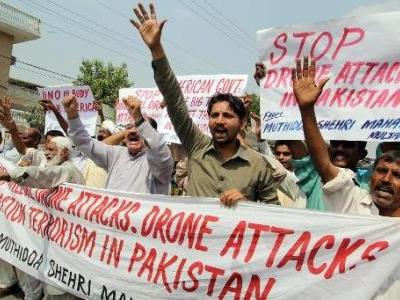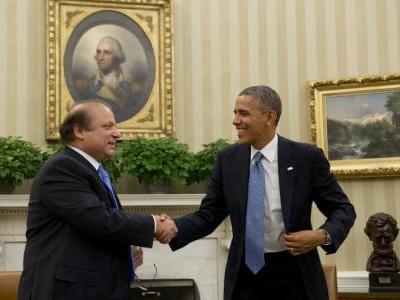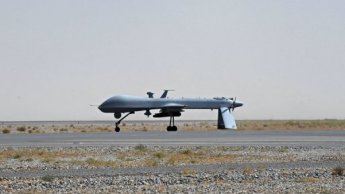Sharif goes to Washington, and the drone drama is scripted
Love the timing, gotta love the timing.
A day before Pakistani Prime Minister Nawaz Sharif was set to meet US President Barack Obama at the White House, news editors across the world seemed to be reading from the same script.
The October 23 meeting was the first between the Pakistani and US leaders since Sharif took office in June. There are so many critical issues at stake, including the 2014 US withdrawal from Afghanistan and the intractable issue of Kashmir, that has turned this nuclear armed corner of the globe into “one of the world’s most dangerous zones” as former US President Bill Clinton put it.
Add the fraught US-Pakistan relations since the 2011 killing of Osama bin Laden into the mix, with US officials accusing the Pakistani military of duplicity in the fight against Islamist extremism and Pakistani officials opposing controversial US drone strikes.
Then there’s the whole business of military and economic cooperation – all tied up to the business of aid worth billions of dollars.
On the brighter side, Pakistan merits a pat on the back for successfully conducting a landmark poll in May, when millions of Pakistanis braved Taliban threats to exercise their democratic rights and vote in an election that swept the secular, pro-business Sharif into power.
So many issues, so little time – how do we squeeze it all in?
Simple. We focus on one issue: “Drone strikes killing more civilians than US admits, human rights groups say” was a typical headline echoed in news bulletins and features across the world. At one point on Tuesday morning, all the major international news websites looked identical with some version of “Amnesty report on Pakistan drone strikes contradicts US assurances”.

Human rights groups of course had timed the release of their comprehensive, carefully researched reports for the eve of Sharif’s US visit. That’s a case of advocacy groups doing a good job.
The media covering just one issue to the exclusion of the others however is a case of editors reading from the same script – researched and written by Amnesty International.
On Tuesday afternoon, when Sharif addressed a gathering at the Washington-based USIP (United States Institute of Peace), the Pakistani leader spoke about a host of issues from cooperation on Afghanistan, to a desire to “live in peace” with neighboring India and finding “some way of resolving” the Kashmir issue.
What did the media focus on? Sharif’s few comments on the drone strikes of course.
But that was the day before.
Hitting a location ‘at the request of your government’
The day after the Obama-Sharif meeting, it was another story.
Or rather, the same story from the other side.

In a detailed report based on top-secret CIA documents and Pakistani diplomatic memos, The Washington Post revealed that senior Pakistani officials had endorsed the drone program and had routinely received briefings on strikes and casualty counts over a four-year stretch from late 2007 to late 2011.
Wonder who leaked those CIA papers to the Post’s Bob Woodward and why they timed it to coincide with Sharif’s visit? But never mind.
It’s no secret that top Pakistani officials had approved the launch of the drone program. Back in early 2009, experts in the US and France were telling me that Pakistani officials opposing drone strikes were merely playing to the domestic gallery. But I didn’t think it was a comprehensive reading of the situation and took their claims with a pinch of salt. By 2010, Wikileaks documents revealed that Islamabad had “quietly acquiesced” with drone strikes.
By the time Sharif got off the plane at Dulles airport, the assumption in Af-Pak circles was that Islamabad had provided the drone green light back in 2007, but had no idea the program would expand to the scale it did around 2010-2011.
The Washington Post revelations however, provide a detailed account of extensive briefings between the CIA’s Counterterrorism Center and the Pakistani government.
Apparently Michael Morell, then CIA Deputy Director, gave regular briefings on drone operations to Hussain Haqqani, then Pakistani ambassador in Washington. Documents – including detailed maps and photographs – were routinely relayed “by bag” to senior officials in Islamabad. There were also several references to a direct Pakistani role in selecting targets, including a 2010 entry, which describes hitting a location “at the request of your government”.
Ah, so some US drone strikes were being carried out “at the request” of a government that was enabling a rich anti-drone, anti-US sentiment to bloom and grow back home.
One of the big problems of the drone program before it slipped from CIA to Pentagon control earlier this year was the secretive nature of the strikes. But now we know that Pakistani officials were just as secretive about the program – and a lot more deceptive.
In Pakistan or Yemen, it’s still all about the US
If there are some silver linings to this cloudy business of drone strikes, surely it’s the rare alignment of positions between Pakistani authorities and international human rights groups. Don’t expect the two sides to agree on say, extrajudicial killings and disappearances in places like Baluchistan, where activists accuse the Pakistani military of pursuing systematic "kill-and-dump" campaigns.
As Andrew Lebovich, a researcher with the Open Society Initiative for West Africa, tweeted, “I hope new reports about drone strikes in Yemen, Pakistan spark debate not just about targeted killings but also HR abuses in those areas,” followed by, “I will, however, be surprised if most armchair analysts show a shred of interest about those areas outside of what US does there.”

Another story that’s very difficult to report – and source – are the voices in the tribal areas that approve of the drone strikes.
There’s little doubt of course that the majority of Pakistanis oppose the strikes on very legitimate grounds – that’s what the national polls show.
There’s also little doubt that national pollsters find it very difficult to work in the dangerous, sparsely populated tribal zones.
According to the Economist, a 2009 poll in three tribal agencies found 52% of respondents believed drone strikes were accurate and 60% said they weakened militant groups.
A year later, a group of politicians and civil society groups published what they called the “Peshawar Declaration” opposing “terrorism in all its forms and manifestations”.
On the drone issue, the declaration noted, “If the people of the war-affected areas are satisfied with any counter militancy strategy, it is the Drone [sic] attacks which they support the most. According to the people of Waziristan, Drones have never killed any civilian,” [sic] before continuing, “A component of the Pakistani media, some retired generals, a few journalists/analysts and pro-Taliban political parties never tire in their baseless propaganda against Drone attacks.”
Whoa, this declaration probably goes too far – overlooking the human rights abuses, the secretive nature of the program, civilian casualties and the breach of national sovereignty argument.
But it’s a viewpoint, and it’s one that’s held by at least some residents of the tribal areas. It was also written and signed by a number of political and civil society representatives based in the affected areas.
Unfortunately, as the Economist noted, life soon became difficult for the signatories. “If anyone speaks out they will be eliminated,” Said Alam Mehsud, one of the organizers who was forced to leave Pakistan for a while, told the British weekly.
In any case, Sharif’s visit apparently went well – unlike his last visit in 1999. According to the AP, the Pakistani prime minister invited Obama to visit Pakistan, but the US president did not publicly reply. If he does accept, expect the news cycle to drone on auto-control once again.




1 Comments
Post new comment